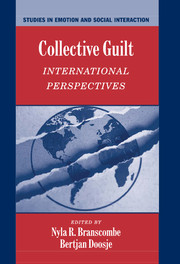Book contents
- Frontmatter
- Contents
- Preface
- List of Contributors
- Collective Guilt
- Section 1 Defining the nature of collective guilt
- Section 2 The Relationship Between Group Identification and Collective Guilt
- Section 3 Consequences for Intergroup Relations
- 11 Intergroup Forgiveness and Guilt in Northern Ireland: Social Psychological Dimensions of “The Troubles”
- 12 Intergroup Reconciliation Processes in Israel: Theoretical Analysis and Empirical Findings
- 13 On Whether to Apologize to Indigenous Australians: The Denial of White Guilt
- 14 Racial Wrongs and Restitutions: The Role of Guilt and Other Group-Based Emotions
- 15 Importance of Social Categorization for Forgiveness and Collective Guilt Assignment for the Holocaust
- Section 4 Commentary on the Volume
- Index
- References
14 - Racial Wrongs and Restitutions: The Role of Guilt and Other Group-Based Emotions
Published online by Cambridge University Press: 05 January 2012
- Frontmatter
- Contents
- Preface
- List of Contributors
- Collective Guilt
- Section 1 Defining the nature of collective guilt
- Section 2 The Relationship Between Group Identification and Collective Guilt
- Section 3 Consequences for Intergroup Relations
- 11 Intergroup Forgiveness and Guilt in Northern Ireland: Social Psychological Dimensions of “The Troubles”
- 12 Intergroup Reconciliation Processes in Israel: Theoretical Analysis and Empirical Findings
- 13 On Whether to Apologize to Indigenous Australians: The Denial of White Guilt
- 14 Racial Wrongs and Restitutions: The Role of Guilt and Other Group-Based Emotions
- 15 Importance of Social Categorization for Forgiveness and Collective Guilt Assignment for the Holocaust
- Section 4 Commentary on the Volume
- Index
- References
Summary
Racial inequality is everywhere. Throughout the world, people of color tend to be disadvantaged relative to those classified as “White.” There is little doubt that the historical indenture, enslavement, and colonization of people of color has contributed to this systemic inequality. It is also clear that contemporary forms of group privilege and discrimination carry racial inequality into the present and future. This seeming intransigence has led many observers to conclude that racial inequality is an unavoidable product of diverse societies (e.g., Sidanius & Pratto, 1999).
Given the apparent inevitability of racial inequality, one might wonder how anyone is able to muster opposition to it. Yet, a subset of people in every society opposes racial inequality, sometimes at great personal risk. This surprising, and extremely important, fact is our focus. We want to know why people oppose racial inequality. We are especially interested in why members of advantaged groups oppose systems of inequality from which they benefit.
In this chapter we examine how members of advantaged groups come to recognize, and react against, the illegitimacy of racial inequality. We give special attention to group-based guilt as one way in which the advantaged respond to racial wrongs. The first section of the chapter reviews the conceptual and empirical arguments for what racial guilt is. Because it is an unpleasant feeling of self-blame that people prefer to assuage, group-based guilt is associated with efforts to make restitution to those harmed. This is what guilt does to motivate opposition to racial inequality.
- Type
- Chapter
- Information
- Collective GuiltInternational Perspectives, pp. 262 - 283Publisher: Cambridge University PressPrint publication year: 2004
References
- 46
- Cited by



